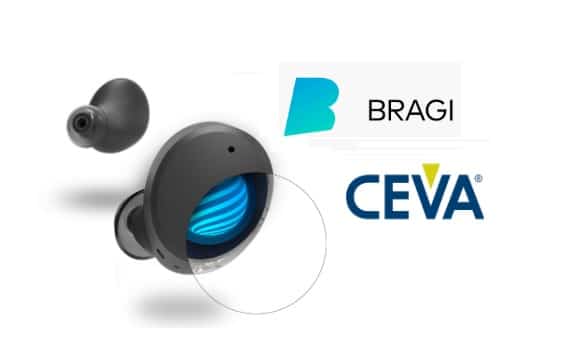MOUNTAIN VIEW, CALIFORNIA — CEVA, Inc., the leading licensor of wireless connectivity and smart sensing technologies, and Bragi GmbH, an award-winning technology company based in Munich, Germany, announced today a strategic collaboration to drive a new class of hearable devices where the user experience is customizable via the industry’s first hearable app store.
Target devices include headsets, hearing aids, True Wireless Stereo (TWS) earbuds and a host of other smart audio devices for the consumer and the smart home.
The partnership takes advantage of the low power, CEVA-BX DSP architecture, along with its advanced LLVM compiler and Eclipse based development tool chain, and Bragi 4, a newly defined operating system (OS) specialized for hearables.
In conjunction with Bragi 4 OS, Bragi’s patented commercial app store will enable technology partners and experts to offer software apps and services such as voice activation, voice biometric, audio post processing and music services. These software packages can be licensed and downloaded directly to devices based on this architecture, allowing individuals to personalize their hearables user experience.
According to the press release, CEVA will also offer “a range of its value-added software via the Bragi app store, including ClearVox for noise reduction, WhisPro for speech recognition, MotionEngine for sensor fusion and the SenslinQ framework for contextual awareness.”
“Imagine buying headphones that adapt according to the needs of the user. Purchase noise-cancelling software just before boarding a plane. Encrypt communication data for sensitive business conversations. Discover that you hear better with voice amplification through try-to-buy offers. On business travel, use your headphones to translate from Chinese into English. Add a feature that alerts someone if your headphones detect you’ve fallen over. The possibilities are endless,” said Nikolaj Hviid, founder and CEO of Bragi.
Through this collaboration, hearables and other smart audio devices will transform in the same way as the mobile phone industry in the ’00s, by replacing single-purpose feature products with flexible products capable of adapting their functionalities to the users through post-purchase apps and services. Technology and hearable companies can create and monetize apps and services on, potentially, tens of millions of devices as a result. Consumer electronics brands will have a new selling platform from a direct relationship with the end-users of their products.
“Our collaboration with Bragi brings a game-changing approach to the design of hearables and other audio devices, where the user experience can be adapted, instantaneously. Our CEVA-BX audio DSPs, voice processing and motion sensing software, and SenslinQ context-aware framework perfectly complement Bragi’s OS and unique capabilities in providing a direct channel for OEMs and ODMs to offer a customizable user experience to consumers through enhanced software and services.”
—Moshe Sheier, Vice President of Marketing at CEVA
For customers wishing to integrate wireless connectivity into their SoC design, CEVA provides Bluetooth, Wi-Fi and NB-IoT solutions, including the latest Bluetooth LE Audio standard.
Any of these technologies can be seamlessly integrated into a SoC design and linked together with the audio offerings via the SenslinQ framework. For further information, visit CEVA.
About Bragi
Bragi was founded in 2013 and went live a year later on the crowdfunding platform Kickstarter. With 15,998 backers who contributed over $3.3 million (USD), Bragi has evolved from a promising startup to a market moving creator of innovative technology, opening the new category of Hearables and Truly Wireless Earphones. In 2018, Bragi introduced a new line of business focused on services and solutions with the presentation of Bragi 4 software. Bragi’s technology suite allows Industries to reduce time and cost to market, enabling high frequency sensor processing to be combined with the lowest memory and processing footprint to date while offering the world´s most efficient artificial intelligence embedded in IoT devices. Through relentless exploration and innovation, Bragi wants to transform the world of smart headphones and IoT by combining and offering its expertise in software and hardware development.
About CEVA, Inc.
CEVA is the leading licensor of wireless connectivity and smart sensing technologies. We offer Digital Signal Processors, AI processors, wireless platforms and complementary software for sensor fusion, image enhancement, computer vision, voice input and artificial intelligence, all of which are key enabling technologies for a smarter, connected world. We partner with semiconductor companies and OEMs worldwide to create power-efficient, intelligent and connected devices for a range of end markets, including mobile, consumer, automotive, robotics, industrial and IoT. Our ultra-low-power IPs include comprehensive DSP-based platforms for 5G baseband processing in mobile and infrastructure, advanced imaging and computer vision for any camera-enabled device and audio/voice/speech and ultra-low power always-on/sensing applications for multiple IoT markets. For sensor fusion, our Hillcrest Labs sensor processing technologies provide a broad range of sensor fusion software and IMU solutions for AR/VR, robotics, remote controls, and IoT. For artificial intelligence, we offer a family of AI processors capable of handling the complete gamut of neural network workloads, on-device. For wireless IoT, we offer the industry’s most widely adopted IPs for Bluetooth (low energy and dual mode), Wi-Fi 4/5/6 (802.11n/ac/ax) and NB-IoT.
Source: CEVA, Bragi







Now, this is truly fascinating, I remember talking about three or four years ago about possibilities in the future where you would buy your hearing aid as a base and then purchase different features in a type of app store. I actually spoke about the concept again recently with some senior people in relation to renting features for the base aid. A similar concept to this one, the idea was that the consumer could be attending a big social event where they wanted the best possible features, but only for a weekend. Could we offer time-sensitive features as an upgrade through some sort of online storefront? It will be interesting to see how this plays out.